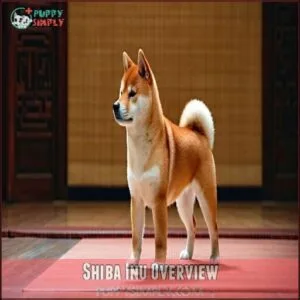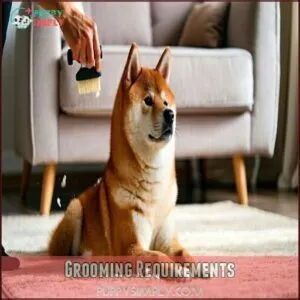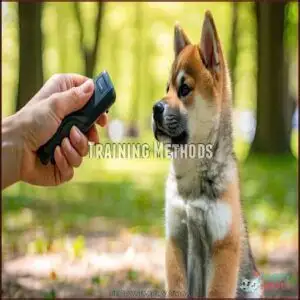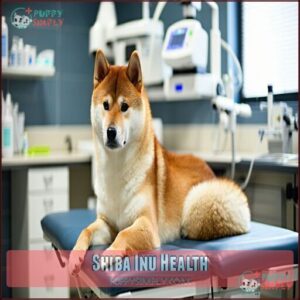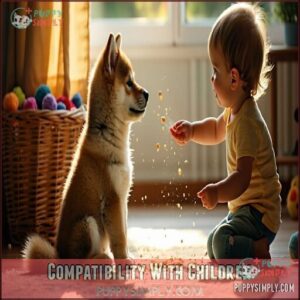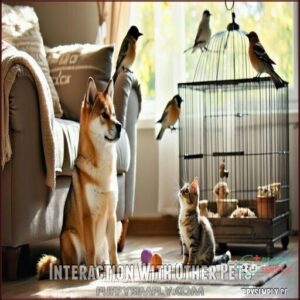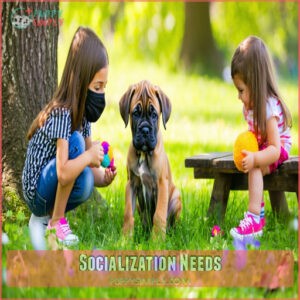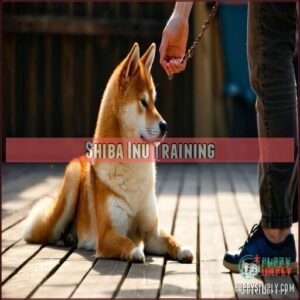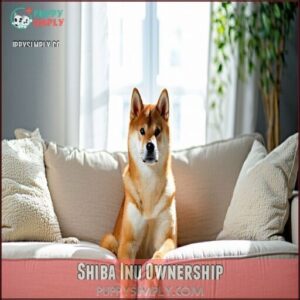This site is supported by our readers. We may earn a commission, at no cost to you, if you purchase through links.

With a plush double coat in striking colors like red, black and tan, or cream, and a signature curled tail, they’re as gorgeous as they are unique.
These dogs are loyal but often display a cat-like aloofness, making them both intriguing and challenging companions.
Shibas thrive on consistency, making patience alongside positive reinforcement essential during training.
Health-wise, they’re prone to issues like hip dysplasia and allergies, so regular vet checkups are a must.
Want one? Their personality might surprise you in the best way, offering a unique experience with their independent nature.
Table Of Contents
Shiba Inu Overview
You’ll find the Shiba Inu combines a fox-like appearance with a fiercely independent personality that has captured hearts worldwide.
A Shiba Inu’s fox-like charm and bold independence make them a captivating companion with timeless appeal.
This ancient Japanese breed features a compact muscular body, distinctive curled tail, and alert triangular ears, all wrapped in a plush double coat that comes in several striking colors including red, cream, and black and tan, showcasing its unique appearance.
Physical Characteristics
Standing face to face with a Shiba Inu, you’ll notice their distinctive foxlike appearance. These compact dogs pack a powerful presence into their medium frame.
A well-planned homemade dog diet is essential for their overall health and well-being.
- Males stand 14-16.5 inches tall, weighing 23-27 pounds
- Females measure 13.5-15.5 inches, weighing 17-23 pounds
- Coat colors include red, cream, black and tan, and sesame
- Triangular, erect ear shape enhances their alert expression
- Tightly curled tail types complete their proud silhouette
Temperament and Personality
Fiercely independent, the Shiba Inu possesses a complex personality that’s often compared to cats.
You’ll find their alertness levels and fearlessness traits both impressive and challenging.
Managing their stubbornness requires patience, but their charming personality makes the effort worthwhile.
History and Origin
The Shiba Inu boasts over 2,300 years of Ancient Japanese Roots, making it one of Japan’s most treasured Nihonken (native breeds).
Your knowledge of this breed isn’t complete without understanding:
- Originally bred for hunting small game in mountainous regions
- Nearly faced extinction during World War II
- Was saved through careful Breed Preservation efforts that combined three distinct bloodlines
Today’s Modern Popularity proves these resilient dogs survived history’s challenges.
Shiba Inu Care
You’ll need to establish a consistent care routine for your Shiba Inu that includes daily exercise, weekly brushing, and positive reinforcement training.
Proper care guarantees your independent-minded companion remains healthy and well-adjusted, preventing the boredom that can lead to excessive chewing and other unwanted behaviors, which is ensured through proper care.
Exercise Needs
A Shiba Inu’s energy means they’re not couch potatoes.
Their exercise needs include daily walks and outdoor play for physical activity. High-energy pups thrive with mental stimulation, like puzzle toys or training games.
Without enough dog exercise, they might channel energy into mischief. Balance this with a shiba inu diet to keep your puppy Shiba Inu happy and healthy.
Providing regular mental stimulation activities is essential for their overall well-being.
Grooming Requirements
Shiba Inu grooming is simple yet essential.
Their thick coat needs brushing twice a week for shedding control. Finding the right dog brush is important for effective grooming.
Try these grooming tips:
- Brush regularly to avoid matting.
- Trim nails monthly for ideal nail care.
- Check ears weekly to prevent infections.
- Bathe occasionally—their catlike grooming keeps them clean naturally.
Master these brushing techniques for healthier pet grooming!
Training Methods
Looking to master Shiba Inu training? Start with clicker training—it’s fun and effective.
Obedience tips like reward-based training and patience are key, as their trainability depends on mutual trust.
Leash walking teaches boundaries, while agility training channels energy.
For stubborn moments, behavior modification techniques can help. Shiba Inu training thrives with consistent methods and positive reinforcement.
Effective training also involves understanding positive reinforcement techniques to build a strong bond with your dog.
Shiba Inu Health
Taking care of a Shiba Inu’s health means staying ahead of potential issues like allergies, patella luxation, and dental problems.
With proper care, these energetic dogs can live healthy lives for 13 to 16 years.
Common Health Issues
Shiba Inu health isn’t always carefree, but with the right attention, they can thrive.
Common health problems include patellar luxation, hip dysplasia, and allergies. Eye problems and dental issues also need monitoring.
- Patellar Luxation: Affects knees, causing discomfort.
- Hip Dysplasia: Joint problems requiring care.
- Allergies: Can lead to itchy skin.
- Dental Issues: Regular brushing helps prevent complications.
To manage these issues, understanding dog training secrets is vital for their overall well-being.
Genetic Health Concerns
You’ll want to keep in mind genetic health concerns, such as Hip Dysplasia and Eye Problems, when bringing a Shiba Inu home.
Regular Health Screening and Genetic Testing can help identify issues like Patellar Luxation and allergies, ensuring the best possible shiba inu health outcomes for your new companion.
Lifespan and Aging
Think of the journey ahead—Shiba Inu health is robust, with an average lifespan of 13-16 years.
Age-related changes don’t slow them down much if you focus on senior care.
Here’s how to extend their quality of life:
- Provide regular vet checkups.
- Offer balanced nutrition.
- Encourage gentle exercise.
- Monitor for mobility issues.
Their golden years can sparkle!
Shiba Inu Family Suitability
Shiba Inus can be great family companions, but they’re not the best fit for every household.
Understanding their needs and temperament is key to knowing if they’ll thrive in your home.
Compatibility With Children
Building a bond between kids and Shiba Inus requires early socialization and supervised interactions.
These kid-friendly family dogs thrive with gentle play and patience training. Teach children maturity when handling them, as these spirited companions prefer calm, respectful treatment.
Understanding energetic playmates is vital for a harmonious household.
Here’s an overview:
family bonds
Interaction With Other Pets
Shiba Inu personality traits, like independence and boldness, mean they’re often cautious around other animals.
Canine socialization is essential to help them adjust in multi-pet households. Feline coexistence is possible, but early efforts to socialize Shiba Inu routines matter.
For small pet safety, always monitor them—strong prey drive can’t be ignored. Shiba Inu temperament thrives with structured pet introductions.
Socialization Needs
To balance the reserved shiba inu temperament, early puppy socialization is key.
Introduce your dog to varied family dynamics, dog interactions, and public exposure.
Proper canine socialization reduces stranger danger and boosts confidence.
Use positive socialization techniques like gradual exposure and rewards.
A well-socialized Shiba becomes a happier companion—one who thrives in diverse settings while maintaining their unique charm.
Shiba Inu Training
Training a Shiba Inu requires patience and consistency, as their independent nature can make them challenging to manage.
By focusing on positive reinforcement and addressing behaviors like prey drive early, you can help your Shiba grow into a well-mannered companion.
Addressing Prey Drive
Shiba Inu prey drive can be strong, thanks to their hunting roots.
Recall training and impulse control are essential to keep them focused during walks.
Use redirection techniques, like toys or treats, to shift their attention from squirrels or birds.
Combine these with consistent socialization strategies, and you’ve got a recipe for managing their instincts while keeping training effective.
Proper nutrition, including a balanced dog food diet, is also essential for maintaining their overall health and energy levels.
Housebreaking Methods
Housebreaking a Shiba Inu can be easier with the right training methods.
Start with crate training—dog crates create a safe space and prevent accidents. Combine the Crate Method with a Reward System to reinforce good potty training behavior.
Leash housebreaking helps guide them outside consistently, while clicker training signals success. Patience and consistency are key!
Positive Reinforcement Techniques
Ever wondered how to make training your Shiba Inu a breeze? Positive reinforcement is the key! With this reward-based training method, you’ll discover their trainability and strengthen your bond.
- Use Clicker Training for precise feedback.
- Reward good behavior with treats or praise.
- Play Training Games to keep lessons fun.
- Combine Behavior Modification with consistent Obedience Tips.
Shiba Inu Ownership
Owning a Shiba Inu requires careful consideration of both the financial and time commitments involved.
To understand their needs, you must be ready for the responsibilities of providing a loving, structured home, and make certain you’re prepared.
Adoption and Buying Options
Looking for a Shiba Inu? Explore adoption through rescue organizations or animal shelters for a rewarding choice. Preferably, finding a breeder guarantees responsible practices.
Compare a playful Shiba Inu puppy versus an adaptable adult based on lifestyle. The adoption process varies, but whether through shiba inu rescue groups or breeders, you’ll gain a loyal companion.
Puppies offer a long bonding experience but require time-intensive care. Adults are easier, sociable dogs but have a limited lifespan left.
The choice between puppies and adults depends on your lifestyle and preferences. Puppies are best for families with time/energy, while adults are suitable for **
Cost and Responsibility
Owning a Shiba Inu isn’t just love—it’s a financial commitment.
Between ownership costs such as veterinary fees, food expenses, a supply budget for essentials, and potential insurance options, be prepared for monthly expenses.
Shiba Inu care also includes addressing Shiba Inu health issues that might arise.
Responsible pet ownership means budgeting wisely to guarantee your furry friend gets the best life possible. Considering Shiba Inu insurance options is vital for managing these expenses effectively.
Long-term Commitment
Committing to a Shiba Inu means embracing their 13-16 year lifespan. It’s a journey of lifelong care, financial planning, and adapting your lifestyle.
- Build a strong emotional bond—they’re loyal yet independent.
- Account for time commitment with daily exercise and grooming.
- Prioritize shiba inu health through regular vet visits.
- Understand their unique temperament and needs.
- Expect lifestyle changes for harmony.## Frequently Asked Questions
Are Shiba Inus prone to separation anxiety?
Shiba Inus can be prone to separation anxiety due to their strong bond with family.
They’re independent but still crave company, making training and gradual alone time essential to help them feel secure when left alone.
How often should I brush my Shiba Inu’s coat?
Brush your dog’s coat weekly to keep shedding under control and their fur looking great.
During shedding seasons, increase grooming to a few times weekly.
A good brush session also strengthens your bond—win-win!
Can Shiba Inus live comfortably in hot climates?
Living in hot climates sounds like a breeze, doesn’t it?
While Shiba Inus can adapt, you’ll need to make certain shade, fresh water, and limit outdoor activity during peak heat to keep them comfortable.
Are Shiba Inus good with children?
They can be good with children if socialized early, but their independence and strong will mean they might set their own boundaries.
Supervise interactions, teach respect, and focus on fostering a bond through patience and play.
Conclusion
Owning a Shiba Inu dog is like striking gold—it’s a mix of beauty, independence, and loyalty.
These fox-like companions bring a unique balance of charm and challenge, keeping you on your toes with their spirited nature.
With proper care, training, and patience, they’ll reward you with a bond unlike any other.
Whether it’s their striking coat, quirky temperament, or unmatched loyalty, the Shiba Inu dog is a one-of-a-kind breed that wins hearts effortlessly with its unique balance.

